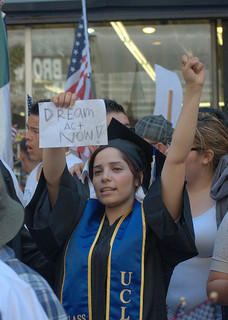DREAMers to seek Republican Cooperation

 By Raisa Camargo,Voxxi
By Raisa Camargo,Voxxi
Dreamers are hoping to start the ball rolling on the DREAM Act and signaled Thursday morning that they are going to reach out to key Republican players including Florida Sen. Marco Rubio.
Rubio, who is noted as being a rising star in the Senate, emphasized his commitment to work with both parties in developing a version of the DREAM Act last Spring.
Recalling their conversations with him, supporters said the time is now ripe to find Republican allies in the coming weeks. During a press conference call Thursday morning, advocates of United We DREAM were quick to shine a light on Rubio.
 Rubio’s clout in the Senate might renew efforts on the DREAM Act
Rubio’s clout in the Senate might renew efforts on the DREAM Act
“Senator Rubio from Florida stepped up to engage his party on conversations around immigration and finding solutions that will protect dreamers from deportations and he engaged in conversations with us – we see Sen. Rubio as a key Republican that we will continue to lead in our conversations, but also the Republican leadership,” said Cristina Jimenez, director of United We Dream.
The Senator engaged in several discussions with Democratic allies including Rep. Luis Gutierrez (D-Ill.), who heads the immigration task force of the Congressional Hispanic Caucus. Although Rubio’s legislation never saw the light of day after the president initiated his move for deferred action in June, critics often claimed that it was “watered down.”
It would not offer a pathway to citizenship or legal permanent residency.
“They’re going to receive a non-immigrant VISA that is renewable. It permits them to stay legally,” Rubio told Hispanic media including VOXXI during a meeting last April. “At some point, they will be able to aspire like any other person who has a non-immigrant VISA to convert themselves as a legal resident. That’s not prohibited.”
Supporters were also quick to clarify that they’re receptive to Rubio’s previous proposal, but are not endorsing it yet. United We DREAM said they never got to really see Rubio’s version. From their perspective, there were various concerns that they expressed to Rubio regarding his proposal.
Tea Party backed Ted Cruz is also poised to play a pivotal role in the U.S. Senate. Yet, his positions on the DREAM Act have also been contentious. Daniel Rodriguez of United We Dream also noted that it’s still to be seen whether Cruz will take a more extreme position on the legislation.
“We will be engaging with everyone who wants to meet me and have this conversation, but I do think it’s important before we focus on Texas we focus on speakers John Boehner (R-Ohio) and Minority Leader Mitch McConnell because it is on their hands – it is on their laps whether the Republican Party will be acting a different way,” said Jimenez.
Republican support might stagnate in the House
For skeptics that still seems like a long shot. The Senate offers a different dynamic in the way of establishing bipartisan cooperation considering that Latino voters are pivotal in the states for Senators to win reelection. Yet, critics indicate that it might be more difficult to sway Republican representatives in the House because some of those districts have been gerrymandered or there is not enough of a diverse population in those districts.
One case in point is Steve King (R-Iowa), who is a vocal opponent of the DREAM Act. King is the vice chairman of the House immigration subcommittee. In June, he rejected Rep. David Rivera (R-Fla.) “Studying Towards Adjusted Residency Status Act,” or STARS – as amnesty. He also opposes Rubio’s version.
“They would have a hard time getting (the bills) through the (House) Judiciary Committee,” King was quoted as saying back in June.
For some, King along with chairman of the House immigration subcommittee Rep. Lamar Smith (R-Texas) are high-ranking members that hold plenty of clout among other Republicans. Democrats criticize that both of them are very much opposed to any type of immigration legislation because they see it as “amnesty.”
Democrats wary of Republican extremism
A Democratic staffer offered a rebuttal to that statement indicating that they don’t need full Republican support only about 10 percent of Republicans in the House to step forward. He also indicated that in general the Republicans margin of victory is smaller than it was a week ago because of Latino voters.
Still, getting support on the Hill, as opposed to the dynamic Senate, is a looming question they will contend until early January.
“Ten percent of those are afraid to come forward. They use to be able to come forward,” indicated the staffer. “The House is a little bit more difficult because it’s more partisan. The real question is would Mr. Boehner allow the circumstances of that vote to happen?”
To many, Romney’s loss was due to Republican extremism and the inability to connect to changing demographic. And other analysts are quick to dictate that the lurch to the far right might continue.
“We haven’t had any Republicans up to this point reach us – but we are reaching out to them because we know and understand that we need to continue to reach out to both parties on this conversation,” said Jimenez. “We need full Republicans and Democrats to come together and to create a solution to this.”
This article was first published in Voxxi.
Raisa Camargo is a staff writer at Voxxi.
[Photo by paulinaclemente]
